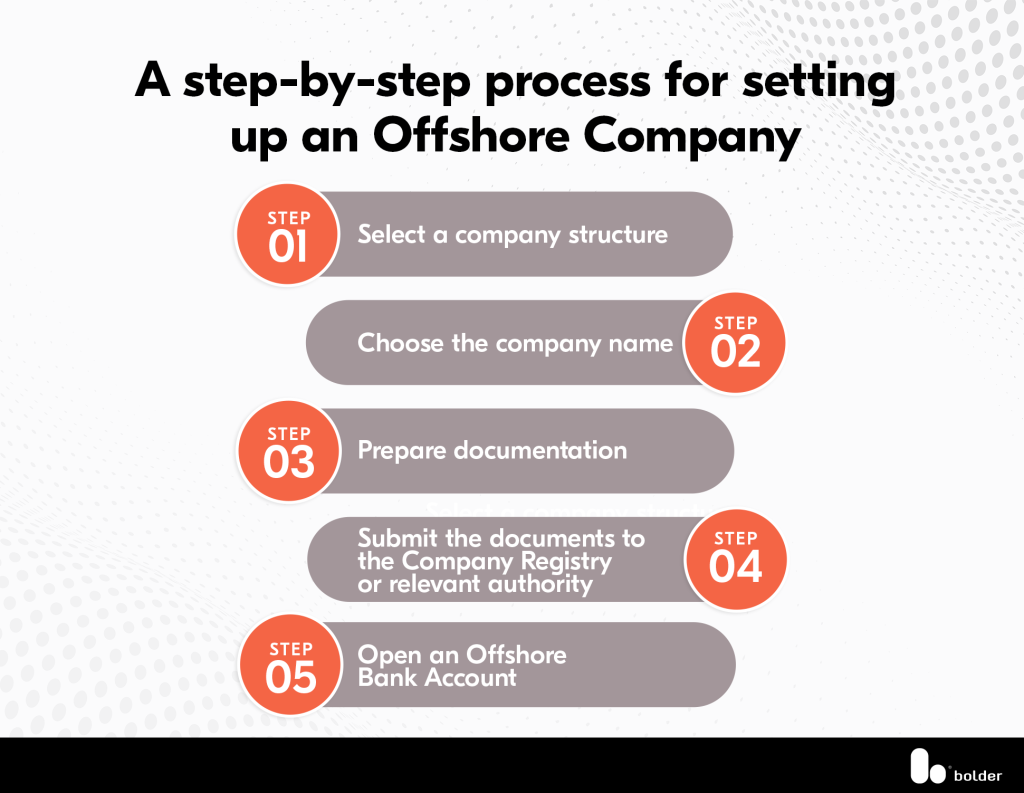Offshore Company Formations: Frequent Errors and How to Prevent Them
Debunking Offshore Company Formations: Just How They Operate and What to Anticipate
Offshore company formations can seem complicated and enigmatic. Offshore Company Formations. These entities, usually developed for tax obligation advantages and personal privacy, run under one-of-a-kind legal frameworks. Business owners might locate themselves navigating via a puzzle of laws and conformity demands. Recognizing the intricacies is necessary for success. What are the actual benefits? What are the prospective risks? A closer assessment exposes the subtleties that could impact decision-making substantially
Recognizing Offshore Companies: Meanings and Types
Offshore companies are entities established in a jurisdiction outside of an individual's or organization's main country of home, often for purposes connected to tax obligation optimization, asset defense, or governing benefits. These business can take numerous forms, including limited responsibility business (LLCs), worldwide business firms (IBCs), and offshore counts on. Each kind serves specific features and charms to various requirements.
Limited liability firms supply proprietors with security from personal obligation, while worldwide company firms are preferred for their adaptability and marginal coverage demands. Offshore trusts, on the various other hand, are utilized mostly for estate planning and possession defense.
The selection of territory substantially affects the company's operations, as some places provide extra beneficial legal frameworks and personal privacy protections. Offshore Company Formations. Recognizing the distinctions in between these kinds is essential for individuals and organizations considering overseas structures, as each option carries different effects for governance and compliance
The Advantages of Developing an Offshore Company
Establishing an offshore firm can give numerous benefits, particularly for those looking for to boost their financial techniques and protect their assets. One substantial advantage is tax obligation optimization; lots of jurisdictions supply favorable tax obligation rates or exceptions, enabling companies to preserve more revenues. Additionally, overseas companies can give a layer of privacy, securing the identifications of owners and investors from public scrutiny.
An additional advantage is property protection. By placing possessions in an offshore entity, individuals can secure their riches from prospective lawful claims or political instability in their home nations. This framework likewise helps with worldwide organization operations, making it possible for simpler accessibility to international markets and diverse clients.
The establishment of an overseas firm can enhance reputation and reputation, appealing to clients that value international company methods. On the whole, these advantages make offshore firm formations an appealing option for services and individuals intending for monetary development and safety.
Key Factors To Consider Before Developing an Offshore Entity
Before developing an offshore entity, a number of vital factors have to be evaluated. Lawful compliance needs, tax obligation implications and advantages, as well as territory option, play a considerable function in the decision-making procedure. Comprehending these considerations can assist individuals and organizations navigate the intricacies of overseas business formations effectively.

Legal Compliance Requirements
When thinking about the formation of an offshore entity, recognizing legal compliance requirements is vital to assure adherence to both regional and global regulations. Prospective company proprietors should familiarize themselves with laws regulating company enrollment, reporting responsibilities, and operational criteria in the chosen territory. This includes validating the legal needs for shareholders and directors, in addition to guaranteeing compliance with anti-money laundering (AML) and know-your-customer (KYC) policies. In addition, organizations must remain familiar with any licensing needs certain to their market. Involving neighborhood legal and economists can supply useful insights, guaranteeing that all required documents is prepared and submitted properly. Inevitably, complete understanding of lawful conformity aids mitigate risks and cultivates a sustainable offshore operation.
Tax Obligation Effects and Benefits
Various company owner think about the tax ramifications and benefits of forming an offshore entity as a vital variable in their decision-making process. Offshore companies can offer substantial tax obligation advantages, such as decreased corporate tax obligation rates, exemption from particular regional tax obligations, and the ability to postpone taxes on foreign revenue. These advantages can bring about improved productivity and capital, making overseas frameworks appealing for international service procedures. Furthermore, the potential for tax obligation treaties may further lessen tax responsibilities. It is vital for organization proprietors to comprehend the intricacies included, consisting of compliance with both international and local tax obligation laws. Involving with tax specialists is suggested to navigate these complexities effectively and assure perfect tax obligation preparation techniques.
Jurisdiction Option Elements
What factors should one take into consideration when choosing a territory for offshore firm development? Key factors to consider consist of tax obligation effectiveness, regulatory environment, and political stability. Jurisdictions with desirable tax routines can greatly influence earnings. The regulatory landscape must use flexibility and ease of compliance, permitting effective service operations. Political security is crucial, as it ensures the safety and security of properties and continuity of procedures. Additionally, the credibility of the jurisdiction can affect client count on and service partnerships. Access to financial solutions and the accessibility of expert assistance solutions are also important. Ultimately, understanding regional legislations pertaining to privacy, ownership, and reporting needs is vital to Clicking Here ascertain that the offshore entity lines up with the service proprietor's goals and legal commitments.
The Refine of Setting Up an Offshore Business
Establishing an offshore company entails a collection of tactical actions that require mindful planning and conformity with worldwide laws. At first, a specific need to select an ideal jurisdiction that lines up with their organization goals and supplies beneficial tax obligation benefits. Following territory option, the next action is to pick a distinct firm name and prepare the necessary paperwork, consisting of articles of unification and shareholder arrangements.
Once the documents prepares, it has to be submitted to the relevant authorities in addition to the required charges. After approval, the Continue business will certainly get a certificate of unification, officially developing its legal existence. The private have to then open up a company checking account to facilitate financial deals.
Keeping an offshore firm entails adhering to continuous conformity needs, such as annual coverage and tax obligation responsibilities, which differ by territory. For that reason, recognizing each action is crucial for an effective offshore firm development.
Lawful and Governing Structure for Offshore Business
While developing an offshore business can provide considerable advantages, it is important to steer via the intricate lawful and regulative framework that governs such entities. Each jurisdiction has its own set of legislations that dictate every little thing from business development to tax and compliance needs. These policies are made to avoid illegal tasks, such as money laundering and tax obligation evasion, and typically call for complete documentation and openness.
Crucial element of this structure include the necessity of appointing neighborhood directors, maintaining a licensed workplace, and sticking to annual coverage responsibilities. Additionally, several territories impose details licensing requirements for sure company tasks. Comprehending these legal stipulations is essential for making sure compliance and mitigating risks related to fines or lawful disputes. Engaging with lawful specialists who specialize in overseas business can help in steering through this detailed landscape, ultimately assisting in a successful and compliant overseas business operation.
Common Misconceptions About Offshore Companies
Numerous people hold misunderstandings concerning overseas firms, frequently equating them with tax evasion and illegal activities. However, it is important to recognize that these entities can operate lawfully within a structure made for legitimate company techniques. Making clear the lawful condition of offshore companies can aid eliminate these myths and promote a more accurate understanding of their objective.
Tax Obligation Evasion Myths
Despite the expanding appeal of offshore companies, false impressions concerning their usage for tax obligation evasion continue. Numerous individuals incorrectly believe that establishing an overseas entity is only a method to stay clear of tax obligations. Offshore firms are usually utilized for legit functions, such as property security, worldwide company expansion, and investment diversity. The perception that all overseas tasks correspond to illicit tax obligation evasion neglects the intricacies of global tax guidelines and compliance needs. Furthermore, the vast bulk of overseas territories have actually carried out measures to fight tax obligation evasion, promoting transparency and info exchange. This mischaracterization can hinder legit companies and financiers from discovering the potential benefits of offshore firm formations while continuing an unfavorable preconception surrounding these entities.
Lawful Status Clarified
The legal standing of offshore business is commonly misunderstood, bring about a variety of misconceptions. Numerous think these entities get more run in a lawful grey location, thinking they are inherently illegal or unethical. In reality, offshore companies are genuine companies developed under the legislations of certain territories, made for various reasons, including possession security and market development. Another common misunderstanding is that overseas firms escape tax obligations entirely; however, they go through the guidelines and tax obligation obligations of their home countries. Additionally, some people think that offshore business can be quickly exploited for cash laundering or illegal activities. While abuse can occur, a lot of jurisdictions enforce strict compliance and transparency legislations to reduce such threats, making sure that overseas business operate within lawful structures.

Managing and Running Your Offshore Company Successfully
Effectively handling and running an offshore firm requires a calculated approach that balances compliance with neighborhood regulations and the quest of service goals. Successful offshore administration involves understanding the jurisdiction's tax legislations, reporting demands, and operational regulations. Employing local experts, such as accountants and legal advisors, can offer vital understandings right into traversing these complexities.
Furthermore, establishing clear communication channels and operational procedures is crucial for preserving effectiveness. Using innovation for job monitoring and collaboration can enhance productivity, while regular performance reviews guarantee alignment with strategic goals.
In addition, keeping durable economic documents is necessary, as openness promotes count on with stakeholders and adhere to international criteria. Finally, being versatile to modifications in regulations or market conditions permits overseas business to pivot successfully, guaranteeing lasting sustainability and development. By adhering to these concepts, company owner can take full advantage of the benefits of their offshore endeavors while mitigating threats.
Frequently Asked Questions
How Much Does It Cost to Preserve an Offshore Business Every Year?
The price to maintain an offshore business annually differs significantly, commonly ranging from $1,000 to $5,000, relying on jurisdiction, services required, and compliance commitments. It is vital to think about additional costs for details demands.
Can I Open Up a Bank Account for My Offshore Firm Remotely?
Opening a checking account for an offshore business from another location is typically feasible. Nonetheless, requirements may vary by territory, often necessitating documentation and verification procedures, which can make complex the remote application experience for people.
Exist Details Countries Understood for Easier Offshore Firm Formations?
Certain countries, such as Belize, Seychelles, and the British Virgin Islands, are renowned for their desirable guidelines and streamlined processes concerning offshore company developments, drawing in entrepreneurs seeking efficiency and discretion in service operations.
What Kinds of Businesses Are Ideal Fit for Offshore Business?
Certain businesses, such as investment, consultancy, and ecommerce firms, often gain from offshore companies due to tax obligation advantages, personal privacy, and regulative flexibility - Offshore Company Formations. These entities commonly prosper in jurisdictions that advertise favorable organization atmospheres
Just How Can I Guarantee Conformity With Neighborhood Laws When Operating Offshore?
To ensure compliance with regional laws when running offshore, it is necessary to engage legal professionals, carry out extensive research on jurisdiction policies, and maintain clear monetary documents, thereby decreasing threats related to non-compliance.
